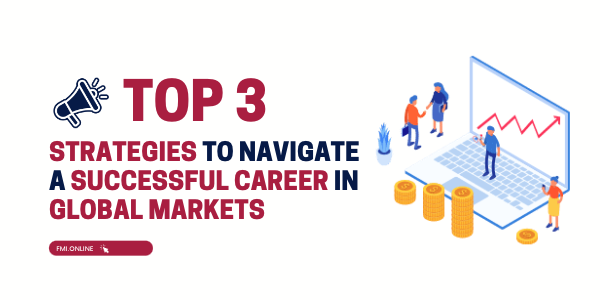The traditional corporate structure has evolved as a result of technological advancements, process innovation, and cost-saving initiatives. While departments like HR have consolidated, technology plays a much wider role today. With increasing environmental concerns we can also observe the development of new departments like ESG, which requires interdisciplinary expertise from management, law, finance, etc.
As a result, today, career paths are not nearly as straightforward as a decade ago. Starting your career with an entry-level position and working your way towards the top by the time you retire is only one of many ways to look at your career. You can try moving diagonally to a related department, move sideways and shift to another company, or step down and start all over again with a different career. Global markets, which are responsible for providing services like sales & trading, hedging strategies and industry insights to institutional clients, is no different to this phenomenon. In this article, we will explore the top 3 strategies that you require to navigate a successful career in global markets.
Upskilling
Upskilling is the most effective strategy to progress in your career. A low-cost online course, book, and other resources from an institution like FMI, Skillshare, or Linkedin can help you enhance or develop a skill set.
As part of global markets, one of the skills that you can start working on is learning a new language. While working with institutions across countries with deals involving millions of dollars, the importance of communication can’t be overstated. Being able to communicate in more than one language will not only allow you to develop better relationships with your clients but will also help you communicate effectively with your counterparts from different countries. If you are already fluent in English, you can consider giving one of the Asian languages a try, such as Mandarin, given the rise of HNI from these countries.
Moreover, you might consider working on your soft skills, like communication, persuasion, collaboration, creativity, emotional intelligence, etc. This will not only help you in your existing roles but can also come in handy when planning to switch your career path.
Networking
Whether it’s working with company CFOs or dealing with dealers from the floor of stock exchanges, global markets rely heavily on human interactions. There are various ways your connections can help you take the next step in your career. If you are looking for a promotion, maintaining good relationships with senior bankers goes a long way. If you’re looking to move diagonally and transition into a different role, you can reach out to your peers from those departments and learn what they do. Moreover, a wide network could also provide you with new opportunities, a job with a better salary or an offer for a better position. For example, if you are connected with HR, they can recommend your name for a new opening when it comes up before they start with the formal process.
The most effective way to build your network is by first tapping into your existing network. You can try reconnecting with your batch mates who are in similar professions, and with the bankers who you met during your job hunt. They may lead you to doors you didn’t even know existed. Professional exhibitions and trade organisations are another way to develop your network, along with common gatherings, such as office parties, economic conclaves, etc. You can also add new connections via platforms like LinkedIn and Coffee Mug.
Open-mindedness
In today’s dynamic business environment, employers prefer employees who are digitally equipped, open to learning new things, loyal, and multi-skilled. Throughout your career, you’ll require constant upskilling, learning and adapting to new ways of doing business. You must see things with an open mind, anticipate change and prepare for it accordingly. This will not only help you grow but will also enable you to see new opportunities.
Conclusion
While in the last two decades technology and globalisation have brought unprecedented change to investment banking, it has also created opportunities. To navigate a successful career in these changing, uncertain times, you must be open-minded, willing to adapt, and willing to learn. The ability to network will enable you to take advantage of upcoming opportunities and progress in your career. Be patient and proactive, understand what you want, set realistic goals, and make sure your contributions are visible.










 60+ hours
60+ hours 9 courses
9 courses



